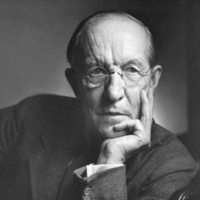The Beggar and the Angel
An angel burdened with self-pity
Came out of heaven to a modern city.
He saw a beggar on the street,
Where the tides of traffic meet.
A pair of brass-bound hickory pegs
Brought him his pence instead of legs.
A murky dog by him did lie,
Poodle, in part, his ancestry.
The angel stood and thought upon
This poodle-haunted beggar man.
‘My life is grown a bore,’ said he,
‘One long round of sciamachy;
I think I’ll do a little good,
By way of change from angelhood.’
He drew near to the beggar grim,
And gravely thus accosted him:
‘How would you like, my friend, to fly
All day through the translucent sky;
To knock at the door of the red leaven,
And even to enter the orthodox heaven?
If you would care to know this joy,
I will surrender my employ,
And take your ills, collect your pelf,
An humble beggar like yourself.
For ages you these joys may know,
While I shall suffer here below;
And in the end we both may gain
Access of pleasure from my pain.’
The stationary vagrant said,
‘I do not mind, so go ahead.’
The angel told the heavenly charm,
He felt a wing on either arm;
‘Good-day,’ he said, 'this floating’s queer
If I should want to change next year—?’
‘Pull out that feather!’ the angel said,
‘The one half black and the other half red.’
The cripple cried, 'Before you’re through
You may get fagged, and if you do,—’
The angel superciliously—
‘My transformed friend, don’t think of me.
I shall be happy day and night,
In doing what I think is right.’
‘So so,’ the feathered beggar said,
‘Good-bye, I am just overhead.’
* * * * *
The angel when he grasped the dish,
Began to criticize his wish.
The seat was hard as granite rocks,
His real legs were in the box.
His knees were cramped, his shins were sore,
The lying pegs stuck out before.
In vain he clinked the dish and whined.
The passers-by seemed deaf and blind.
As pious looking as Saint Denis,
An urchin stole his catch-penny.
And even the beggar’s drab-fleeced poodle
Began to know him for a noodle.
‘It has an uncelestial scent,
The clothing of this mendicant;’
He cried, 'That trickling down my spine
Is anything but hyaline.
This day is like a thousand years:
I’d give an age of sighs and tears
To see with his confectioned grin
One cherub sitting on his chin.
That cripple was by far too sly—
I wish he’d tumble from the sky,
That things might be as they were before;
I really cannot stand much more!’
* * * * *
The beggar in the angel’s guise,
Rose far above the smoky skies.
But being a beggar, never saw
The charm of the compelling law
That turned the swinging universe:
’Twas gloomy as an empty purse.
Often with heaven in his head,
He blundered on a planet dead.
And when with an immortal fuss,
He singed his wings at Sirius.
He plucked the feather with his teeth,
The charm was potent and beneath,
He saw the turmoil of the way
Grown wilder at the close of day,
With the sad poodle, can in hand,
The angel still at the old stand.
‘My friend,’ said the angel, hemming and humming,
‘Truly I thought you were never coming.’
‘That’s an unhandsome thing to say,
Seeing I’ve only been gone a day.
But there’s nothing in all your brazen sky
To match the cock of that poodle’s eye.
Take your dish and give me my wings,
’Tis but a fair exchange of things.’
* * * * *
The beggar felt his garment’s rot,
The horn ridge of each callous spot;
He clinked his can and was content;
His poverty was permanent.

